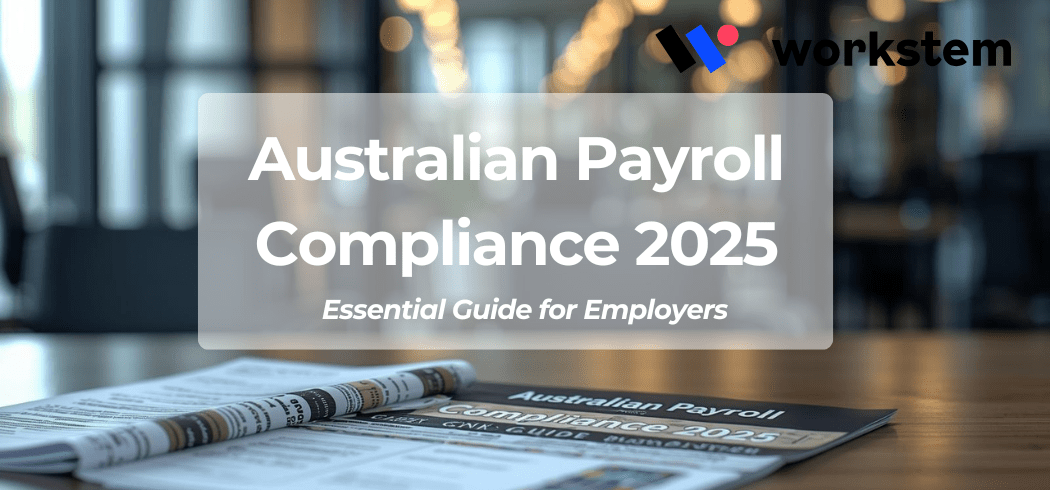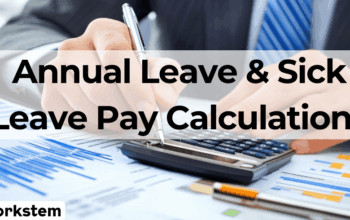Table of content
- What is Payroll Compliance and Why Does It Matter in 2025?
- How Has Australian Payroll Compliance Changed for 2025?
- When Do Employers Need to Implement Payroll Compliance Updates?
- Where Can Employers Find Reliable Payroll Compliance Resources?
- Who is Responsible for Ensuring Payroll Compliance in Your Organisation?
- Best Practices for Maintaining Payroll Compliance in 2025
- How Workstem Simplifies Payroll Compliance
- FAQs About Payroll Compliance
With significant regulatory changes taking effect in 2025, payroll compliance has become more critical than ever for Australian employers. From criminal penalties for wage theft to increased superannuation rates, businesses must adapt quickly to avoid severe legal consequences. This comprehensive guide explores essential payroll compliance Australia requirements that every employer needs to understand.
What is Payroll Compliance and Why Does It Matter in 2025?
Payroll compliance refers to adhering to all federal and state regulations governing employee compensation, including wages, superannuation, taxes, and entitlements. In 2025, non-compliance isn’t just costly, it’s criminal. From 1 January 2025, intentional underpayment of staff wages, superannuation, and leave entitlements is a criminal offence under the Fair Work Act.
The stakes have never been higher. Wage theft offences carry hefty penalties of up to 10 years’ imprisonment and/or fines of up to $1,565,000 for individuals or $7,825,000 for corporations.
How Has Australian Payroll Compliance Changed for 2025?
-
Criminal Penalties for Wage Theft
The most significant change in payroll compliance Australia is the criminalisation of intentional wage underpayment. Employers may commit a criminal offence where they intentionally underpay wages or entitlements, including superannuation or salary sacrifice arrangements. However, accidental or inadvertent underpayment, or those resulting from genuine mistakes, are not subject to criminal penalties.
-
Updated Minimum Wage Requirements
From 1 July 2025, the National Minimum Wage is $24.95 per hour or $948.00 per week before tax. This 3.5% increase affects all employers and must be reflected in payroll systems immediately.
-
Increased Superannuation Guarantee
From 1 July 2025, employers must pay 12% of ordinary time earnings (OTE) for each eligible employee. This represents the final scheduled increase in the superannuation guarantee rate, making accurate calculation more important than ever.
When Do Employers Need to Implement Payroll Compliance Updates?
Timing is crucial for payroll compliance. Key dates for 2025 include:
- 1 January 2025: Criminal wage theft penalties commenced
- 1 July 2025: New minimum wage and superannuation rates took effect
- Quarterly: Superannuation payments due within 28 days of quarter end
- Monthly: Minimum payment frequency for all employees
- Ongoing: Single Touch Payroll (STP) reporting requirements
Where Can Employers Find Reliable Payroll Compliance Resources?
For accurate payroll compliance Australia information, employers should regularly consult:
- Fair Work Ombudsman for wage and entitlement guidelines
- Australian Taxation Office for tax and superannuation requirements
- Department of Employment and Workplace Relations for legislative updates
- Professional payroll software providers like Workstem for automated compliance solutions
Who is Responsible for Ensuring Payroll Compliance in Your Organisation?
While ultimate responsibility lies with business owners and directors, payroll compliance requires collaboration across multiple roles:
- Directors/Owners: Face personal liability for compliance failures
- HR Managers: Ensure policies align with current regulations
- Payroll Officers: Execute accurate calculations and payments
- Finance Teams: Maintain proper records and reporting
- All Managers: Monitor employee hours and entitlements correctly
Best Practices for Maintaining Payroll Compliance in 2025
-
Implement Robust Systems
Automated payroll systems reduce human error and ensure consistent payroll compliance. Choose software that automatically updates with regulatory changes and integrates STP reporting.
-
Regular Audits
Conduct quarterly internal audits to identify potential compliance gaps before they become serious issues. Review wage calculations, superannuation contributions, and leave accruals systematically.
-
Stay Informed
Subscribe to updates from Fair Work and the ATO. Regulatory changes happen frequently, and ignorance isn’t a defence against non-compliance.
-
Document Everything
Maintain comprehensive records for at least seven years. This includes timesheets, pay slips, superannuation records, and tax documentation.
How Workstem Simplifies Payroll Compliance
Simplify award interpretation and payroll processing with Workstem, the all-in-one workforce management & payroll software designed for every industry. Our system supports 122+ modern awards & 34 EAs, and keeps you up-to-date with changes in wage rates, penalty rates, and overtime rules.Workstem offers:
- Automated award interpretation
- Real-time wage calculations and timesheet syncing
- Employee self-service app for rosters and payslips
- Seamless integrations with Xero, NetSuite, and more
Choose from our Standard or Advanced plan to suit your business needs, and stay Fair Work compliant with confidence.
Book a free demo with our payroll experts and experience how Workstem can streamline your payroll and workforce operations.
FAQs About Payroll Compliance
Q1: What happens if I make an honest mistake with payroll?
A1: Accidental or inadvertent underpayments resulting from genuine mistakes are not subject to criminal penalties. However, you must rectify the error immediately upon discovery and may still face civil penalties.
Q2: How often must I pay superannuation in 2025?
A2: Superannuation must be paid quarterly, within 28 days after the end of each quarter. The rate is now 12% of ordinary time earnings.
Q3: Can employees agree to be paid less than minimum wage?
A3: No. Employees cannot be paid less than their applicable minimum wage, even if they agree to it.
Q4: What should I do if I discover past underpayments?
A4: Employers who identify potential wage theft can self-report to the Fair Work Ombudsman by entering into a cooperation agreement. This demonstrates good faith and may reduce penalties.
Q5: Is payroll compliance different for small businesses?
A5: While the Voluntary Small Business Wage Compliance Code provides some guidance, all businesses must meet the same fundamental payroll compliance Australia requirements regardless of size.
Read More:








